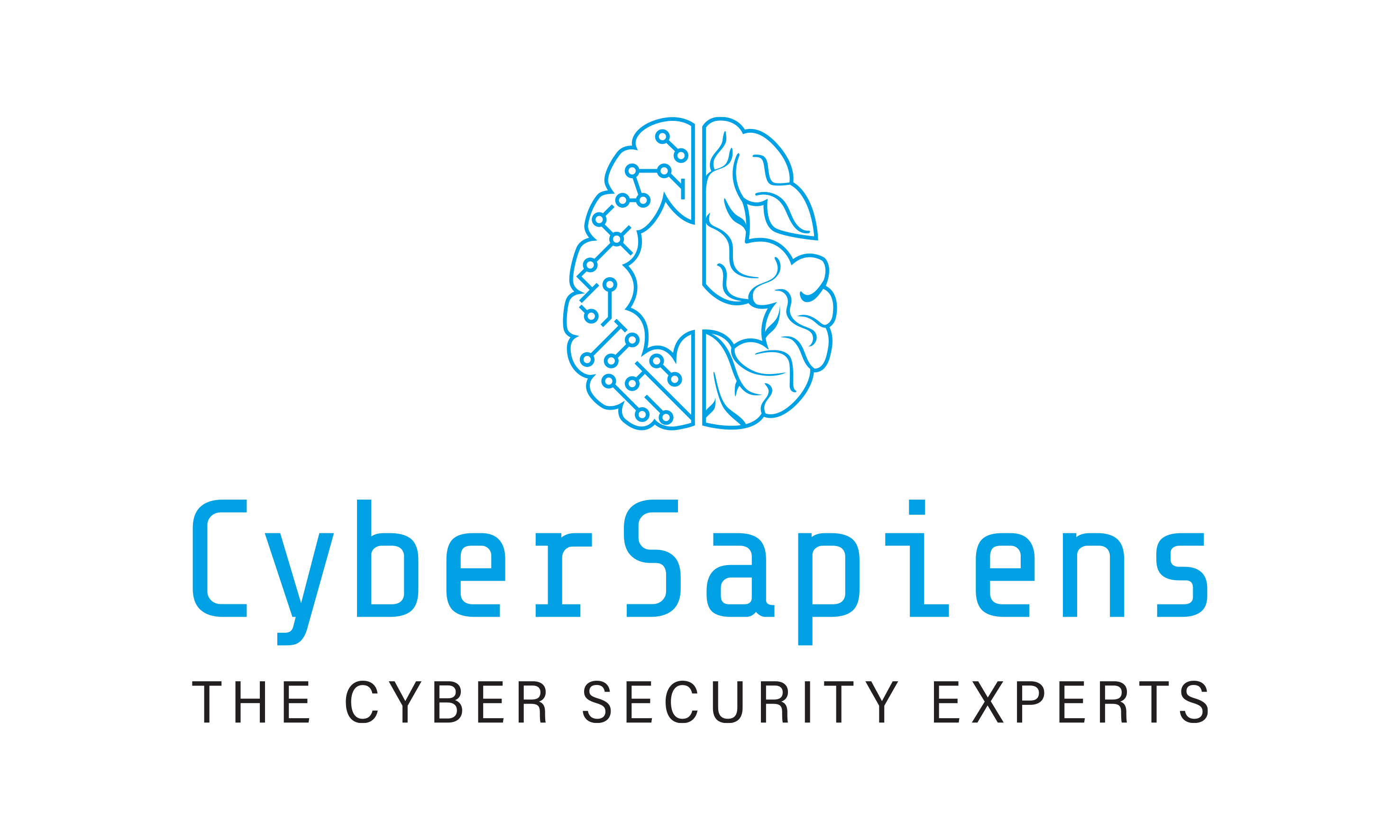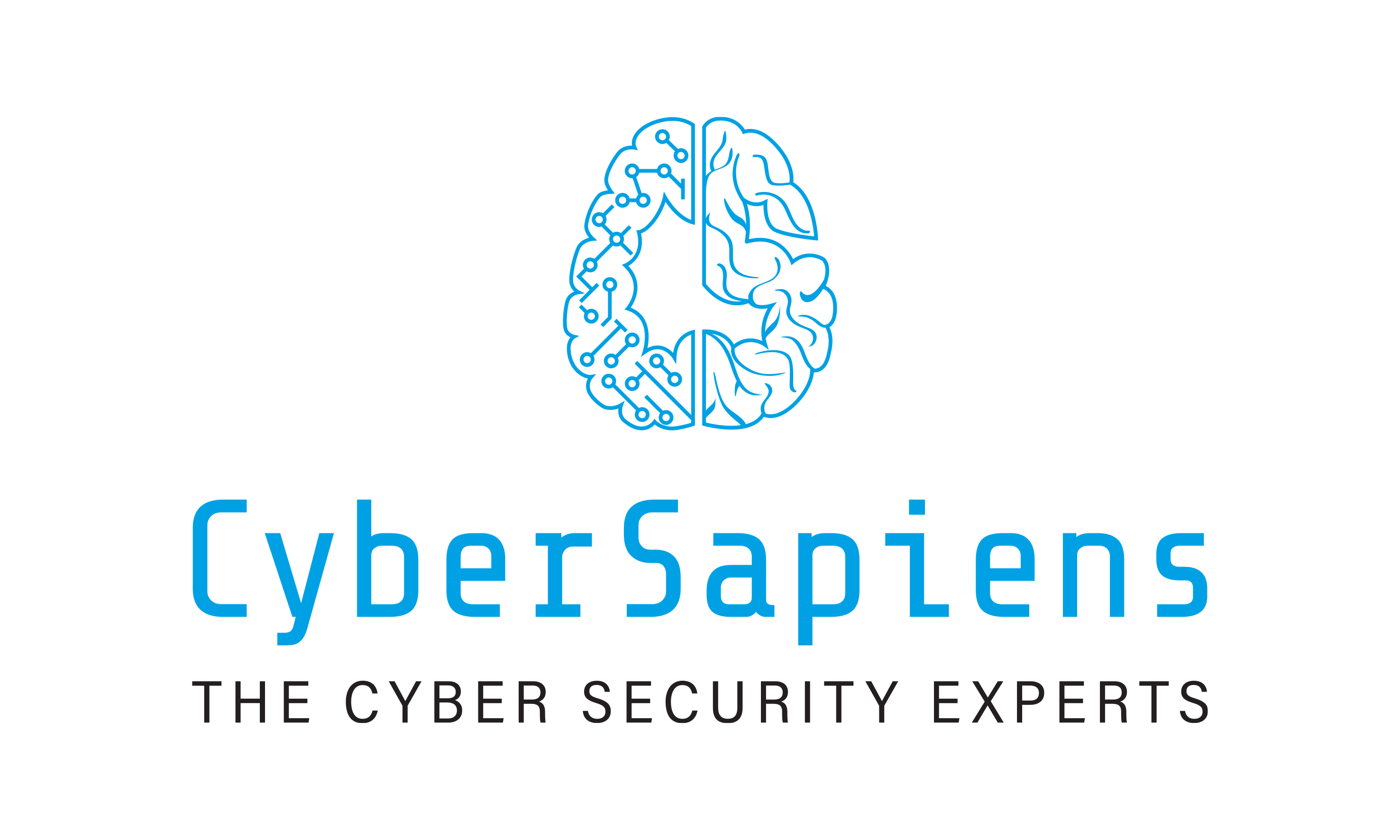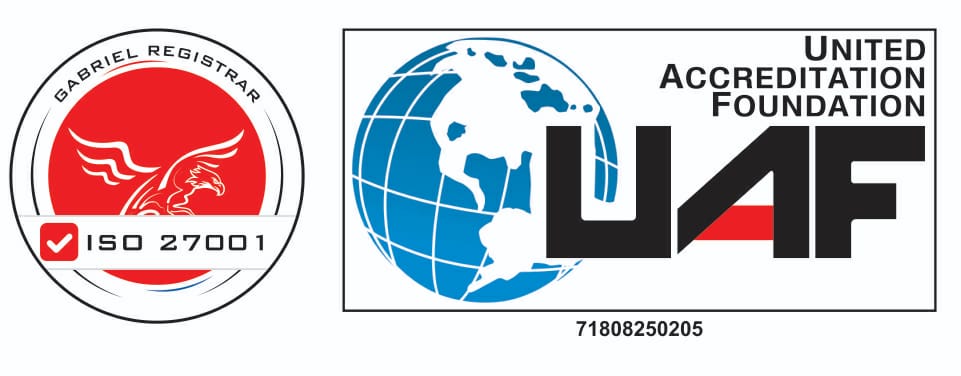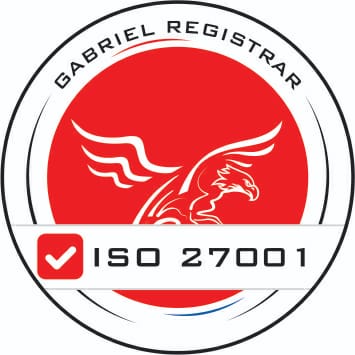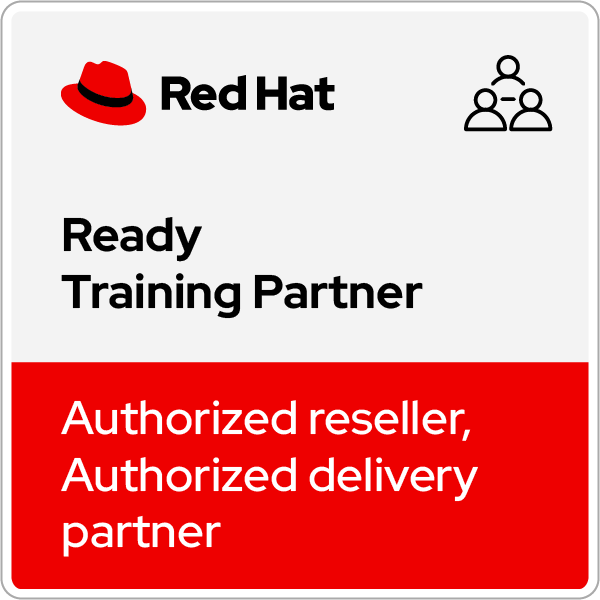Ethical hacking plays a significant role in today’s world, which relies on technology more and more every day.
Ethical hackers on the same note known as white-hat hackers are individuals with the mandate of ensuring that an organization does not fall prey to cyber criminals by presenting believable scenarios or ways by which their security weak points could be exploited. To become a pro-ethical hacker, one has to know the various tools that assist him or her in the mission.
In this article, we will explore the Top 51 Tools You Need to Use to Become a Pro Ethical Hacker.
List of Top 51 Tools You Need to Use to Become a Pro Ethical Hacker

After so much research and references from our cybersecurity experts, we bought you the best 51 Tools You Need to Use to Become a Pro Ethical Hacker.
Don’t be confused by seeing the 51 tools. We have covered every tool with accurate information, so go through each tool thoroughly to become a pro in ethical hacking
1. Nmap
This network mapper and scanner is heavy recognises hosts and services on a network and operating systems and shows the areas of vulnerabilities.
2. Netcat
Not only can Netcat be used for port scanning and creating a connection, but it can also be used to transfer data as well.
3. Maltego
This is one of the graphical link analysis tools that is helpful in the identification of multiple relationships and objectives of a network to facilitate effective reconnaissance.
4. DNSenum
Naming server, MX record, and many other targets belonging to the specific domain should be mentioned, that’s what DNSenum excel
5. Metasploit Framework
One of the biggest players in the ethical hacking field, Metasploit gathers a vast amount of exploits, payloads and auxiliary modules to search for holes and obtain initial access in systems.
6. Angry IP Scanner
This lightning-fast utility actively searches through large networks for live devices, operating systems and open ports giving the operator a snapshot of the attack surface.
7. enum4linux
Enum4linux is a tool based on Linux and helps to gather a lot of information about the target network; shares, users, and password hashes.

8. Bloodhound
This open-source Active Directory reconnaissance tool aids in depicting the kinds of user accounts, groups, and permissions to make the users understand the areas vulnerable or weak in the given Windows domain.
9. Nessus
A versatile industrial weakness scanner, Nessus can detect various security threats in systems and applications; it even has an extensive report on how to eliminate them.
10. OpenVAS
Nessus has its paid version while OpenVAS is an open source solution that brings a complete solution for vulnerability scanning and is backed up by a large community.
11. Avira Free Antivirus SDK
Avira being an antivirus majorly also offers free SDKs for ethical hackers and lets them build a specific vulnerability scanner according to the requirements.
12. Nikto
This web server scanner focuses on Web Application Security, it checks for old software, wrong setting configuration and other exposures.
13. John the Ripper
John the Ripper is one of the most popular password-cracking programs; it uses such methods as brute-force attacks and dictionary attacks on weak passwords.
14. Hashcat
Similar to John the Ripper, Hashcat is also a great choice of password cracker boasting superior performance as it supports multiple platforms and integrates cracking algorithms.
15. Social Engineering Toolkit (SET)
Thus, being the automated set of social engineering tactics such as phishing attacks, SET is an effective way to determine the awareness and preparedness of an organization.
16. Armitage
This software tool allows the management of penetration testing and flexible control as it has a built-in graphical user interface (GUI) that enables the launching of Metasploit exploits in a single location, organizing and controlling sessions, and most importantly; it does all these in an automated manner.
17. Mimikatz
It is an elegant and potent Windows credential-dumping code, that can read all the passwords stored in the network memory, providing the hacker with the tools to move horizontally in a compromised organization.
18. PowerShell Empire
This post-exploitation framework uses PowerShell for tasks such as escalation of privileges, movement from one station to another in the network, and in maintaining presence in the compromised hosts.
19. Meterpreter
Meterpreter is part of the Metasploit which itself enables a sophisticated shell that helps in the exploration of the compromised machines.
20. Cobalt Strike
Cobalt Strike is a paid post-exploitation framework that includes features such a maintaining access, network pivoting and custom payloads.

21. Wireshark
Wireshark can be considered the best network packet analyzer which enables to capture, filter, analyze, and decode network traffic, and thus investigate various aspects of the network communication.
22. Tcpdump
Tcpdump is yet another Windows and UNIX/Linux-based command-line tool that is best used for capturing network traffic and its scripting features make it suitable for automation jobs.
23. Ettercap
MitM is a clever tool of this class as it enables the ethical hacker to capture and decrypt all communication traffic happening between two connected machines.
24. Scapy
Scapy is a Python-interfaced tool that enables one to build packets and integrate Innovative Network Traffic Scenarios in testing and penetration.
25. Aircrack-ng
This suite of tools aims at wireless networks and includes capabilities of cracking WPA/WPA2 passwords by brute force attack and use of a dictionary.
26. Kismet
A wireless implementation of a network sniffer, Kismet discovers nearby wireless networks with hidden SSIDs and may obtain important information about the configuration of the latter.
27. Wireshark (Wireless Capture)
Wireshark is a network traffic analyzer but what I had to learn is that it can also capture wireless network traffic.
28. Burp Suite
This single unified solution for WAST, that is Web Application Security Testing, provides numerous tools that can help to find gaps like SQL Injection, Cross-Site Scripting, and Broken Authentication.
29. OWASP ZAP
ZAP is another WAST platform that is open source like burp suite, this provides
graphic user interface for both manual and automatic testing for web application vulnerabilities.
30. Netsparker
Netsparker is a commercial WAST solution that is best at performing sophisticated attacks automatically and has enhancement options such as fuzzing and dynamic analysis.
31. Hydra
It can also attack many online services like Web applications, databases, and remote servers to check the authentication strength.
32. SQLmap
SQL inject is an automated tool designed to identify and penetrate SQL injection holes or an interesting part of web applications.
33. Nikto (Web Scan)
Indeed, as mentioned above, the Nikto web scan is intended to detect vulnerabilities in web applications, which is very helpful in determining frequently used exploits.
34. W3af
This type of open-source web application attack and audit framework makes it possible to script one or more custom attacks and also automate complex operations of website vulnerability testing.
35. Kali Linux
A preconfigured Linux distribution that is dedicated for penetration testing, Kali Linux has many penetration testing tools included and preinstalled; there are over 300 of them.
36. Parrot OS
They have a security-oriented Linux distro with a very friendly interface and a set of ethical hacking programs included.
37. Autopsy
An Open-source tool in Digital forensics, Autopsy assist in the recovery of lost files, analysis of disk images, and extraction of data from infiltrated computers.
38. VirtualBox/VMware
These virtualization platforms enable ethical hackers to develop environments for practising penetration testing methods without affecting other genuine systems.
39. CloudSploit
This is a platform mainly dedicated to Cloud Infrastructure security analysis, this reveals misconfigurations or possible misconfigurations that put the cloud infrastructure at risk of being breached.
40 AWS Inspector
The Inspector focused on AWS security is a service, which scans the resources located in the AWS environment and reveals risks.
41. Azure Security Center
Like AWS Inspector, Azure Security Center is a service that provides security checks and shade vulnerability scans of Microsoft Azure cloud instances.
42 CloudGoat
From here, this is an open-source project that aims at presenting learners with vulnerable cloud environments that can be used for practice and experience.
43. Drozer
A penetration testing tool for Android, Drozer helps in comprehending and manipulation of the Android application and device vulnerabilities.
44. Frida
Frida is a dynamic instrumentation toolkit to inject code into running processes on Windows, Mac OS X, Linux, iOS and Android, with uses in security assessments and vulnerability research.
45. Metasploit Mobile
Metasploit Mobile is the counterpart of the Metasploit framework for Windows Mobile devices as it comprises exploits and tools that focus solely on the BAE and security of mobile applications.
46. iMAS (iOS Malware Analysis Suite)
This suite helps in dissecting iOS malware, information extraction and studying the malignant act in all iOS applications.
47. Phishing Frenzy
On this website, one can set up tutorials and tests in the form of a fake phishing campaign to assess the employees’ resistance to social engineering methods.
48. SocGraphe
Its main purpose is to map out the social networks of individuals and determine the persons that might be targeted by social engineering.
49. Maltego (Social Engineering)
Although it was mentioned earlier for general reconnaissance, Maltego’s social network visualization feature can also help determine relationships and affiliations of social engineering targets.
50. John the Ripper (Advanced Modes)
Although primarily a password cracker, John the Ripper provides further extensions for cracking most types of cryptographic hash functions used in data protection.
51. Hashcat (Advanced Modes)
Like John the Ripper, Hashcat also has, in addition to these basic functions, specialised modes for attacking other types of cryptographic algorithms that are used in securing the contents of information.
7 Benefits of Above Mentioned 51 Ethical Hacking Tools
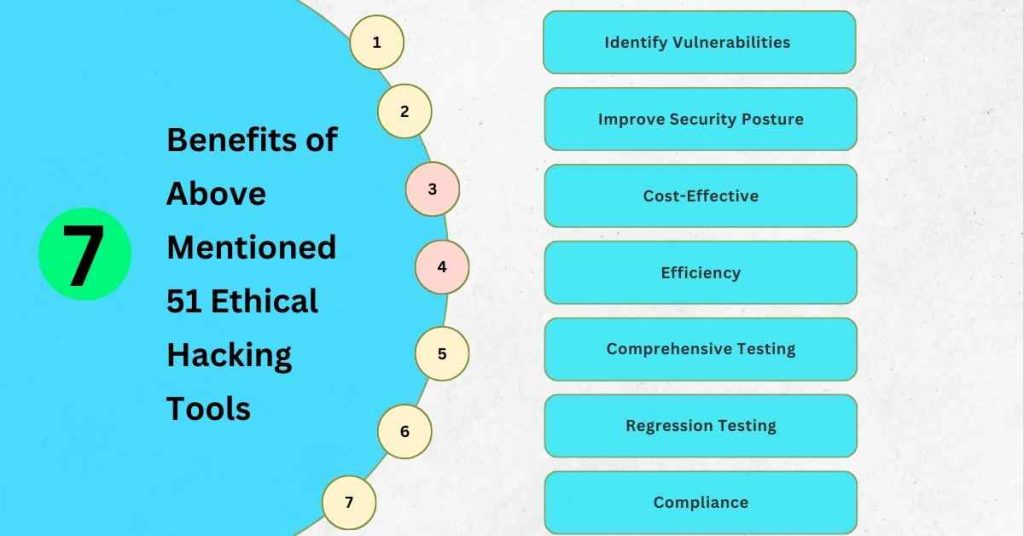
So If you have gone through the above tools you have an idea of how those tools work in your ethical hacking career, Now Let’s explore the benefits of those tools:
1. Identify Vulnerabilities
The above-mentioned ethical hacking tools assist in assessing the threats and risks that can be present in an organization’s systems, network, and applications to eliminate the probability of risks happening.
2. Improve Security Posture
These tools involve probing for flaws and gaps that make an organization more secure against cyber criminals hence making it harder for hackers to conduct an attack or penetrate an organization’s system.
3. Cost-Effective
In general, these tools are cheaper as compared to forming a team of security professionals who test the organization’s systems and networks.
4. Efficiency
These tools also assist in the process of discovery of threats, this is because it reduces the amount of time and effort that would have been needed for testing the systems and networks independently.
5. Comprehensive Testing
All these top tools will help with the comprehensive testing of your IT infrastructure, including following testing an organizations systems, Networks, and applications such as Web applications, APIs, and Cloud Infrastructures.
6. Regression Testing
It also permits ethical hacking for regression testing that seeks to prove that alterations made to any of an organization’s systems or networks do not elicit other susceptibilities.
7. Compliance
At last, these tools will assist companies in addressing regulatory factors of the organization including PCI-DDS, HIPPA, and GDPR as they provide information on areas of compromise within an organization.
Summary: Top 51 Tools You Need to Use to Become a Pro Ethical Hacker
So, guys here is the summary of this blog titled “Top 51 Tools You Need to Use to Become a Pro Ethical Hacker”
- Nmap
- Netcat
- Maltego
- DNSenum
- Metasploit Framework
- Angry IP Scanner
- enum4linux
- Bloodhound
- Nessus
- OpenVAS
- Avira Free Antivirus SDK
- Nikto
- John the Ripper
- Hashcat
- Social Engineering Toolkit (SET)
- Armitage
- Mimikatz
- PowerShell Empire
- Meterpreter
- Cobalt Strike
- Wireshark
- Tcpdump
- Ettercap
- Scapy
- Aircrack-ng
- Kismet
- Wireshark (Wireless Capture)
- Burp Suite
- OWASP ZAP
- Netsparker
- Hydra
- SQLmap
- Nikto (Web Scan)
- W3af
- Kali LinuxParrot OS
- 37. Autopsy VirtualBox/VMware CloudSploit
- AWS Inspector
- Azure Security Center
- CloudGoat
- Drozer
- Frida
- Metasploit Mobile
- iMAS (iOS Malware Analysis Suite)
- Phishing Frenzy
- SocGraphe
- Maltego (Social Engineering)
- John the Ripper (Advanced Modes)
- Hashcat (Advanced Modes)
Conclusion
Finally, we have reached the end of this blog. We hope that you were able to find the best possible ethical hacking tool to use to test out your system and networks. We tried our best to make sure to cover the best top ethical hacking tools and list their benefits.
If you feel that we missed something then do let us know by contacting us directly.
FAQs
1. Is ethical hacking legal?
Ans: Yes, ethical hacking is legal, but only with explicit permission from the owner of the system or network you’re testing. Ethical hackers obtain written consent before conducting any penetration testing activities.
2. What’s the difference between ethical hacking and hacking?
Ans: Ethical hackers have permission to exploit vulnerabilities, while traditional hackers do not. Ethical hackers use their skills to identify and fix security weaknesses, whereas hackers exploit them for malicious purposes.
3. Do I need to be a programmer to become an ethical hacker?
Ans: While programming skills can be beneficial, they’re not always necessary. Many ethical hacking tools have user-friendly interfaces. However, understanding scripting languages like Python can open doors to more advanced tools and techniques.
4. How can I practice ethical hacking safely?
Ans: There are several ways to practice ethical hacking safely. One option is to use virtual machines to create isolated testing environments. Additionally, there are online platforms that offer vulnerable systems for ethical hackers to practice legally.
5. What certifications are valuable for ethical hackers?
Ans: Several certifications demonstrate your proficiency in ethical hacking. Some popular options include Certified Ethical Hacker (CEH), Offensive Security Certified Professional (OSCP), and CompTIA PenTest+.
6. What are some essential qualities of an ethical hacker?
Ans: Ethical hackers should be curious, detail-oriented, and possess strong analytical skills. Additionally, a passion for learning and staying updated on the latest security threats is crucial.
7. Where can I find a job in ethical hacking?
Ans: Many companies seek ethical hackers to test their security posture. You can find job openings in cybersecurity companies, IT departments, and penetration testing firms.
8. Is ethical hacking a good career choice?
Ans: Ethical hacking is a growing field with increasing demand. It offers a challenging and rewarding career path for those passionate about cybersecurity.
9. What are some resources to learn more about ethical hacking?
Ans: There are many resources available online and offline to learn about ethical hacking. Some good starting points include online courses, hacking communities, and books on penetration testing methodologies.

